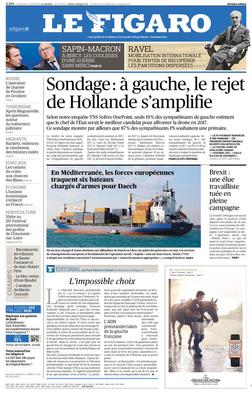
Le Figaro is a French daily morning newspaper founded in 1826. It is headquartered on Boulevard Haussmann in the 9th arrondissement of Paris. The oldest national newspaper in France, Le Figaro is one of three French newspapers of record, along with Le Monde and Libération.
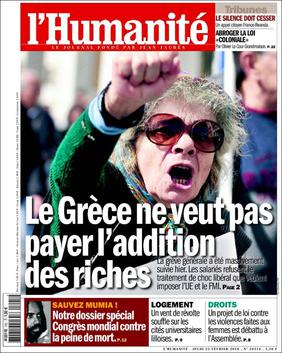
L'Humanité is a French daily newspaper. It was previously an organ of the SFIO, de facto, and thereafter of the French Communist Party (PCF), and maintains links to the party. Its slogan is "In an ideal world, L'Humanité would not exist."
L'Obs, previously known as Le Nouvel Observateur (1964–2014), is a weekly French news magazine. Based in the 2nd arrondissement of Paris, L'Obs is one of the three most prominent French news magazines alongside Le Point and L'Express. Its current editor is Cécile Prieur.

Télérama is a weekly French cultural and television magazine published in Paris, France. The name is a contraction of its earlier title: Télévision-Radio-Cinéma. Fabienne Pascaud is currently managing editor. Ludovic Desautez is deputy editor for digital. Valérie Hurier is deputy editor for print.

L'Express is a French weekly news magazine headquartered in Paris. The weekly stands at the political centre-right in the French media landscape and has a lifestyle supplement, L'Express Styles, and a job supplement, Réussir. Founded in 1953 by Jean-Jacques Servan-Schreiber and Françoise Giroud, L'Express would be considered France's first American-style news weekly. L'Express is one of the three major French news weeklies alongside L'Obs and Le Point.

Paris Match is a French-language weekly news magazine. It covers major national and international news along with celebrity lifestyle features. Paris Match has been considered "one of the world's best outlets for photojournalism". Its content quality was compared to the American magazine Life. Paris Match's original slogan was "The weight of words, the shock of photos", which was changed to "Life is a true story" in 2008. Long coveted by Bernard Arnault, the magazine is owned by Vincent Bolloré.
Le Point is a French weekly political and conservative news magazine published in Paris. Le Point is one of the three major French news magazines.
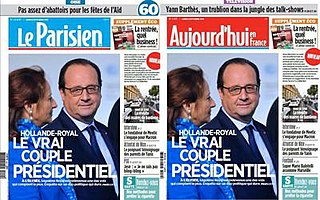
Le Parisien is a French daily newspaper covering both international and national news, and local news of Paris and its suburbs. It is owned by LVMH Moët Hennessy Louis Vuitton SE, better known as LVMH.
The Groupement de Recherche et d'Études pour la Civilisation Européenne, better known as GRECE, is a French ethnonationalist think tank founded in 1968 to promote the ideas of the Nouvelle Droite. GRECE founding member Alain de Benoist has been described as its leader and "most authoritative spokesman". Prominent former members include Guillaume Faye and Jean-Yves Le Gallou.
Louis Pauwels was a French journalist and writer.

Madame Figaro is a French magazine supplement to the Saturday edition of the daily newspaper Le Figaro, focusing on and catering to women.

Voici is a French language weekly celebrity and gossip magazine published in Paris, France.
TV Magazine was a weekly French television listings magazine owned by Figaro Group. As a supplement for the regional press, it was France's leading television listings magazine from 1987 to 2022. TV Magazine became Le Figaro TV Magazine in early 2023, marketed nationally and still owned by the Figaro Group.

Valeurs actuelles is a French weekly news magazine published in Paris. It was initially considered to be right-wing but is today associated with the far right. It was founded by Raymond Bourgine in 1966.
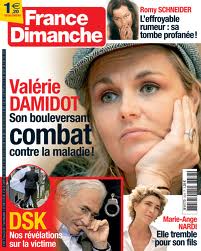
France Dimanche is a French weekly celebrity news magazine published by Czech Media Invest with a circulation of about 150.00 copies. Similar to British tabloids, but with a weekly circulation, it covers celebrity gossip and scandals since 1946.
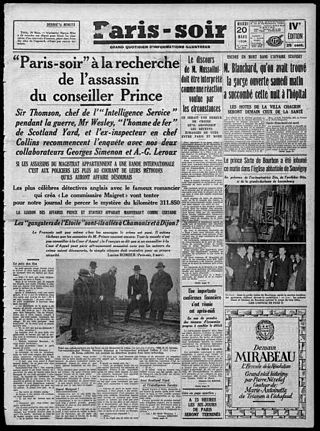
Jean Prouvost was a businessman, media owner and French politician. Prouvost was best known for building and owning the publications that became France-Soir, Paris Match, and Télé 7 Jours.
La Montagne is a French language regional daily newspaper based in Clermont-Ferrand, France. The title was selected to reflect its alignment with the ideas of the Montagnards of the French Revolution. The paper has been in circulation since 1919.
Le Particulier is a French-language weekly business magazine published by the Figaro Group in Paris, France. The magazine has been in circulation since 1949.
Prima is a monthly women's magazine published in Paris, France. The magazine has been in circulation since 1982. It has editions in Spain, Germany, and the United Kingdom.
Femme Actuelle is a French-language weekly women's magazine published in Paris, France. It has also British and Spanish editions.











